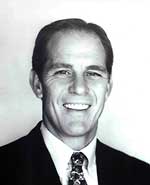
This web page is part of the Michigan Today Archive. To see this story in its original context, click here.
President Ford first to face more aggressive mediaBy Jared WadleyNews Service The Watergate scandal changed how the media covered presidents, including U-M alumnus Gerald R. Ford, according to his son, who will speak on campus next week.
"They were much more aggressive, and you still see that today," says Steven Ford. "The scrutiny has gotten tougher." Steven Ford's talk is scheduled for 7:30 p.m. Feb. 16 at the Ford Presidential Library. It will kick off a new exhibit, "Prime Time Presidents," which will seek to showcase the evolving relationship between television and the nation's chief executives, from Franklin Roosevelt to Bill Clinton. The exhibit will be displayed through Aug. 15 at the library on North Campus. Hours are 8:45 a.m.-4:45 p.m. Monday-Friday. Ford became president in August 1974 after the Watergate scandal forced Richard Nixon to resign. The only president to hold office without being elected by the voters to the presidency or vice presidency, Ford wanted to be candid with the media, unlike Nixon, his son says. One month after becoming president, Ford pardoned Nixon and the "honeymoon was over with reporters," the younger Ford says. "That set the tone for my dad's administration," he says. "The press and country questioned his honesty and candor to pardon Nixon, and he was at odds with the press after that." Ford, an actor and motivational speaker, says his father didn't explain his decision well. "Dad felt very strongly that the country needed to move on, and he knew the Nixon case could drag out in court for four or five years. The only way to (get a fresh start) was to pardon Nixon," he says. Another media incident early in Ford's presidency involved Betty Ford's interview with Mike Wallace on "60 Minutes." The former first lady made a controversial statement that she wouldn't be surprised if her children had tried marijuana, which caused uproar nationwide, Ford says. "She was candid, and the country hadn't seen that before (with other first ladies)," he says. The remark, however, turned out to be a good thing. "It made the country be able to relate to our family," he says, showing that the Fords faced similar challenges as other families. Ford says his father, who at age 92 is the oldest living president, is "doing well ... and sounds great" after spending 12 days in January in a Southern California hospital where he was treated for pneumonia. The doctors kept Ford at the hospital longer than expected, but the family is pleased with his improved health, says his son. "Mom is so glad to have him home," Ford says. "They've had such a love affair for 58 years." Ford says when he visits his parents later this month, the elder Ford has asked him to bring photos of the Joan and Sanford Weill Hall building, which is under construction at State and Hill streets. The facility, which is slated to open in the fall, will serve as the new home for the Gerald R. Ford School of Public Policy.
|
|
Michigan Today News-e is a monthly electronic publication for alumni and friends. |
| MToday NewsE | |
|
|
Michigan Today
online alumni magazine
University Record
faculty & staff newspaper
MGoBlue
athletics
News Service
U-M news
Photo Services
U-M photography
University of Michigan
gateway

